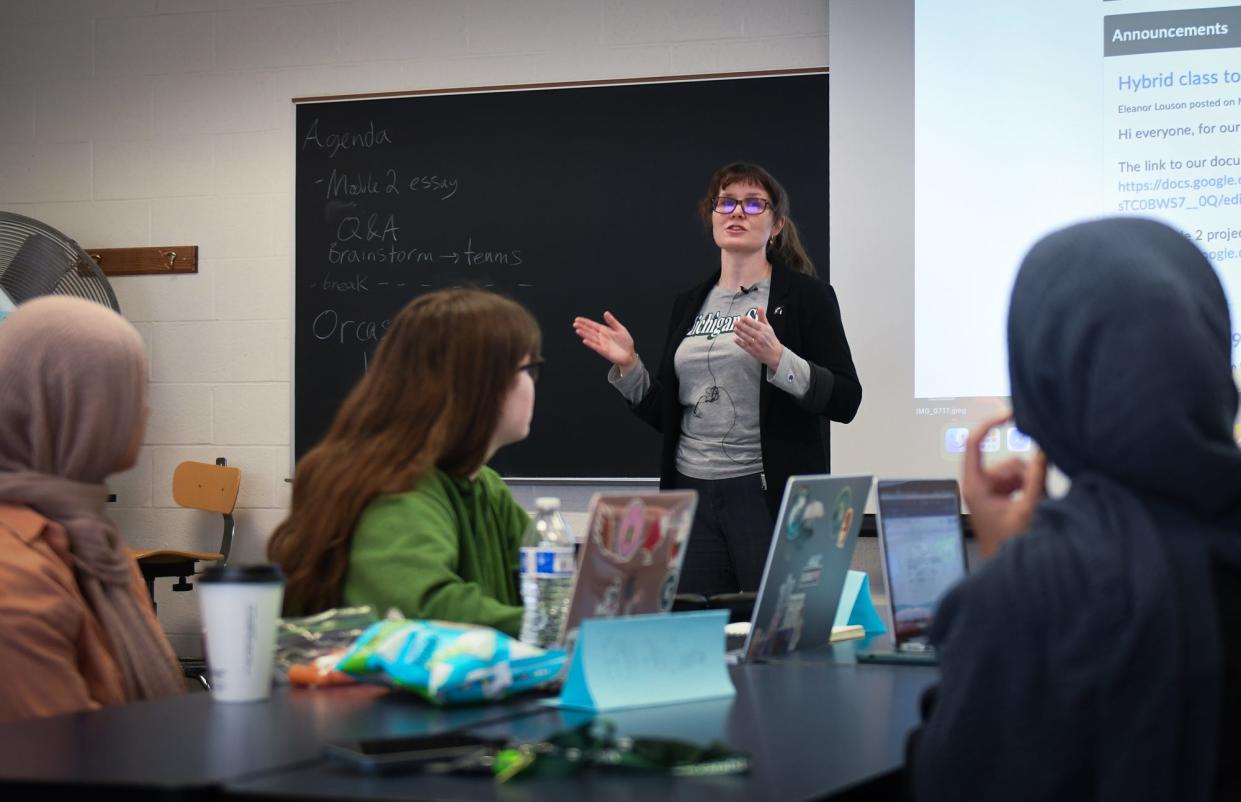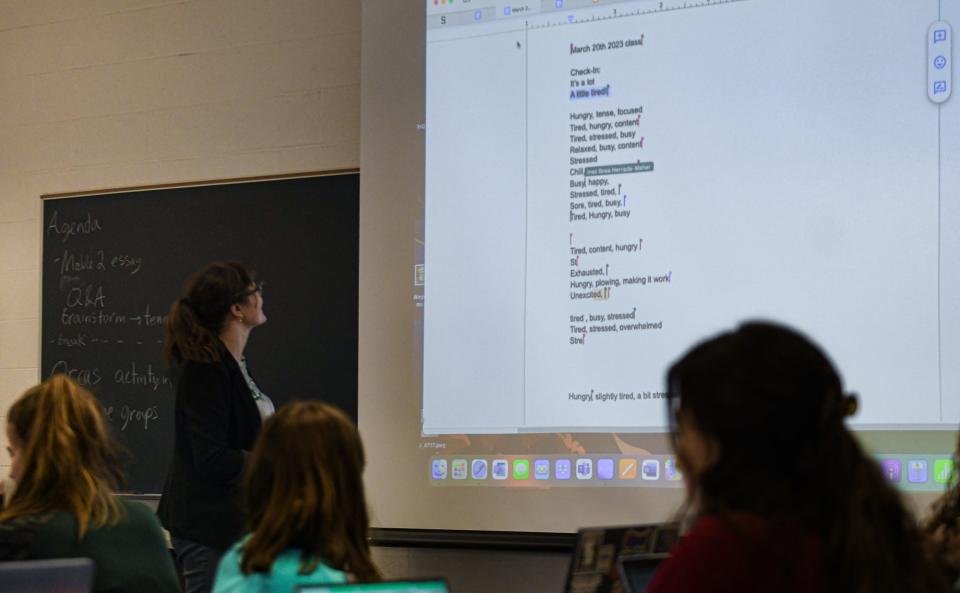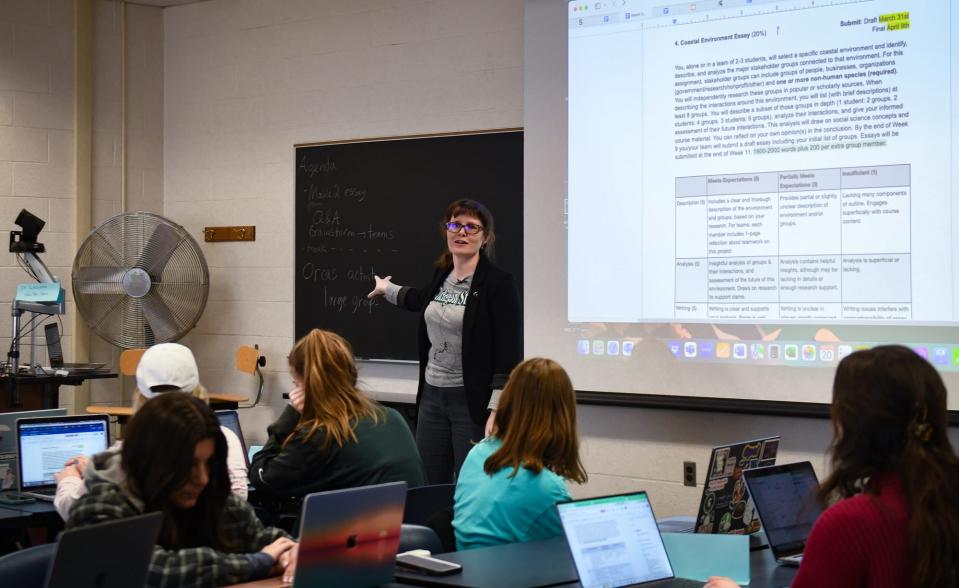MSU professors adapt as they work to 'salvage the semester'

EAST LANSING —When students returned to classes a week after the mass shooting in February, Michigan State University Professor Megan Halpern felt she had to “set aside the syllabus to really interact as humans in situations that were quite traumatic.”
She knew that she couldn't return to class as usual.
"I've had to really let go of some of the learning objectives I had for the students," she said.
It wasn’t the first time. She cited instances during the Larry Nassar scandal, after the 2016 presidential election and the COVID-19 pandemic as other instances in which schoolwork took a backseat.
But in place of the previously set academic goals, Halpern feels that she's created a nurturing environment that helps students process their emotions in their own way.
As the MSU community continues to grapple with the aftermath of the tragedy, professors are easing their academic expectations for the semester and trying to accommodate students' needs.
“You're teaching the whole person and the whole person is who shows up in your classes,” said Eleanor Louson, a professor who adjusted her course following the shooting. “Connecting with the student comes first, and then learning is possible.”
'Empathy and care'
Louson, a professor in the Lyman Briggs College, works with the Center for Teaching and Learning Innovation, which hosted a Feb. 17 event at which they discussed ways faculty could adjust as students returned to classes.
More than 1,100 professors and faculty took part in the webinar that discussed advice and best practices for teaching following the shooting that left three students dead and five others critically wounded. Louson said there was a focus on methods that showed professors' "empathy and care" for their students.
Louson also worked with her colleagues to create a centralized resource for faculty, which consolidated information on employee assistance programs, advice on how to significantly shift course materials and studies on education following traumatic events.
The website links to a University of North Carolina guide from spring 2020 that advises professors on core principles to keep in mind when adjusting courses: "Nobody signed up for this," "the humane option is the best option" and "we will remain flexible and adjust to the situation" are some of the main themes advocated for on this resource.
"We've said a lot over the last few years, but having that empathy, grace and patience for our learners − and also for ourselves," Louson said. "It's hard to educate under these conditions as well, but the connection can come."
Some professors have taken individualized approaches to balancing course work and providing students with the space to process or grieve. Louson also advised professors to defer to their students when possible, asking what forms of support they would find helpful.
Ciera Borden, a political theory and constitutional democracy student, said that she’s been happy with the accommodations provided by her professors soon after the shooting and those that carried past spring break.
“I think that all of my professors have done a great job in just being flexible and extending us grace,” she said.
Borden said that attendance policies, workload and classroom activities have changed significantly since the shooting. For her James Madison senior seminar, the final essay was cut from 20 pages to 10 pages.
"They all had different responses, but I thought they were all appropriate," she said.
Following spring break, Borden said that students have been somewhat scattered and eager to reach the end of the semester.
"Everyone just trying their best to get to the finish line, but I do think that the sense of community within my classrooms is a lot stronger," she said.
'Interact as humans'

Halpern said she listened closely to her students.
“There was no one way I could handle this that would work for all of my students, so I really had to take my cues from them,” Halpern said. “I asked if they wanted to talk about the shooting and the events and they, decidedly, as a class did not.”
Halpern, a professor in the Lyman Briggs College, added that while the class did not want to discuss the attack, she spoke with several students about it individually. Some students have also found ways to incorporate their feelings on the tragedy into their remaining projects.
Halpern made several logistical changes to her one class with student input: The class dropped its final project and offered a virtual option until spring break. What was previously a STEM-focused comic drawing class became, instead, a safe space for self expression and processing, Halpern said.
“We’ve been focusing a lot on drawing and taking time to just be in a space, listen to some music and draw,” she said. “And so, in that way, we've stayed partly tied to the curriculum, but also tied to taking time to heal.”
Halpern said she employed a similar approach when classes and students’ lives were disrupted by COVID, giving them the opportunity to draw comics related to their personal struggles.
“People found it relaxing and a nice break from their other classes and a way to use their brains that they hadn't in years,” she said. “I found that there's really so few opportunities for my students as science majors to engage in self expression, and that was what they were really drawn to.”
Halpern hopes current students will experience similar benefits.
'It's one of those moments'

Melissa Fore, a professor in the James Madison College, had to change significant parts of her coursework following the shooting. Much of her class focused on the documentary “Tough Guise 2,” which examines “violent masculinity” and mass shootings specifically.
“I was moving toward discussions on violent masculinity, and I knew that that just wasn't going to be doable,” she said. “It's one of those moments where, of course, content and what happens in life kind of commingles in a way that's really scary and sad and unfortunate.
“It's textbook, what happened on this campus,” Fore said. “This man was isolated. He was lonely. He felt like he wasn't respected. It's like an entire blueprint for why people do mass shootings and why men act out violently.”
Fore also paused reading quizzes she had conducted daily, pushed back assignment due dates and gave students significant leeway on attendance. She said she’s trying to “salvage the semester” in certain areas.
Lousen has implemented other course changes, such as adding a virtual option, reducing homework and turning the classroom into a space for personal processing.
In some of her first classes back following the shooting, Louson had coloring books, LEGOs and decks of cards for students to enjoy without feeling pressured to return to classwork.
“It seemed like it was a good space for them to be together — not necessarily engaged in rigorous academic work immediately, but just coming together as a class community,” she said.
Contact Sheldon Krause at skrause@lsj.com. Follow him on Twitter@sheldonjkrause.
This article originally appeared on Lansing State Journal: MSU professors adapt as they work to 'salvage the semester' after mass shooting

